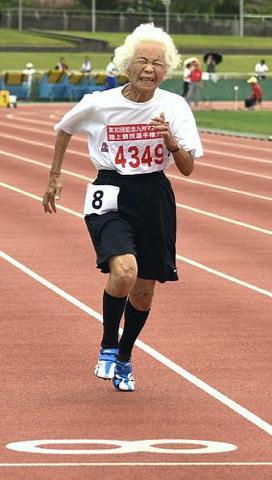I started running seven years ago when I was 41. To my children, I am classified as very old. I remember when my parents turned 40 and to me they seemed ancient. Now, I view my current age of 48 as kind of spring-chickish. Yes, I’m almost half a century, but my heart and soul still feels about 13 (yes, you know that by my love of farts and all things potty humor).
So, even if we start running when we’re old-ish, will it be possible for us to keep running? I have this dream of running well into my eighties. I might be wearing depends and eating gels made out of strained peas, but I hope I’m doing it.

This 90 year old grandma from Japan does a 100m sprint in 23 seconds.
Most research will tell you that you are never too old to run. Hallelujah! However, we can anticipate changes to our bodies that might decrease performance. The need for recovery and rest days will certainly become a priority. Below are some adjustments (a nice way of saying “deteriorations”) your body endures as you move beyond 30 years of age:
- Aerobic capacity decreases (an inevitable decline in maximum heart rate)
- Muscle mass reduces
- Muscle elasticity decreases
- Bone density reduces
- Metabolism slows
- Body fat increases
- Immune system becomes weaker
- After age 35, endurance performance declines by about five to 15 percent per decade.
While this all sounds sucky, there is an upside. Running has been shown to have many benefits for us as we age, ranging from the physical to the mental. Such advantages include decreased risk of heart disease, diabetes and high blood pressure, reduced depression/anxiety, weight management/control, improved mobility and improved bones, muscles and joints.
Reading the above, you would be crazy not to start or to continue to run as you get older. But, for the love of Pheidippides, but smart about it.
- Warm up before each running session for at least a mile. Add in some dynamic exercises to prepare your body to run.
- Take at least two rest days from running per week, if not more.
- Incorporate non-impact cross training, such as swimming, water running or cycling.
- Increase weight/strength training to maintain muscle mass.
While for some, race times will continue to plummet as they age, this does not have to be the case. Smart training choices (see above) can lead to amazing results even as you get older. So run on, old fogeys.
At what age did you start running?
What new issues have you noticed with age? I’m not getting much faster, but my endurance is better.
SUAR
Sources:
Older Runners (Running for Fitness, 2011)
Age Matters (Runner’s World, 2009)
Why It’s Never Too Late to Start Running (Runner’s World, 2013)

